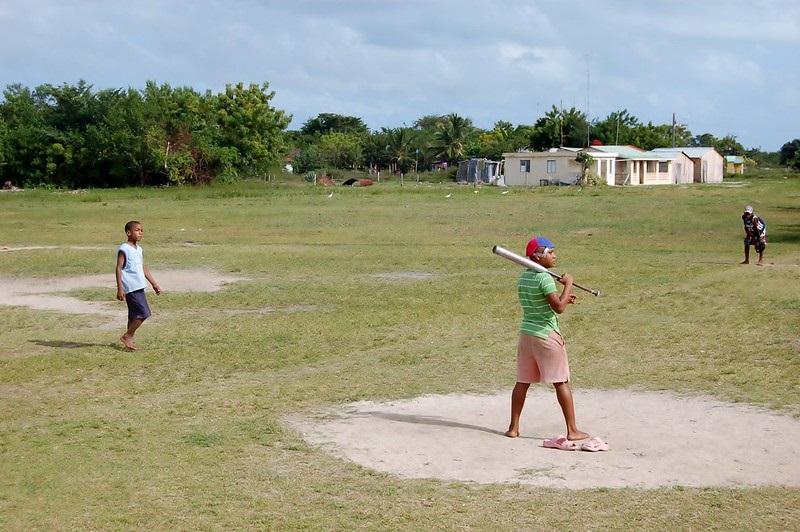
Image Credit: Ian Bruce (CC BY 2.0)
There are many misconceptions about the foundation and origin of baseball in the Dominican Republic. No, American Marines did not teach the game to the local residents in 1916.
Native Dominicans truthfully learned the game of baseball from Cuban immigrants who had fled Cuba in hopes of escaping "La Guerra de los Diez Anos" (the Ten Year War). Cubans, as it turns out, are given credit for influencing the growth of the game throughout all of the Caribbean. On the other hand, it was the Americans that brought baseball to Cuba in the 1860's.
Some of Major League Baseball's brightest stars of both past and present hail from the Dominican Republic. All-Stars such as Manny Ramirez, Alex Rodriguez, David Ortiz, Ubaldo Jimenez, Edinson Volquez, Vladimir Guerrero, Hanley Ramirez and Albert Pujols just to name a few. The current class of Dominican players, however, had their road to baseball stardom paved for them thanks to past greats such as Manny Mota, Ozzie Virgil and the Alou brothers (Matty, Jesus, Felipe). Baseball in the Dominican Republic would not be what it is if it were not for these pioneers.
Today, there is even a Dominican Winter Baseball League which consists of many players from Major and Minor League organizations in the United States. The league consists of six teams including Aguilas Cibaenas, Estrellas Orientales, Gigantes del Cibao, Toros del Este, Leones del Escogido and the legendary Tigres del Licey. League play begins in October when the Major League season ends in the United States and concludes in January just before the start of spring training. The Dominican League champion will then travel to play in the Caribbean Series vs. representatives from Mexico, Venezuela and Puerto Rico.
Baseball is a large part of the culture in this small country, that is for certain. But just as in anything else that offers monetary gain, there are those that look to manipulate and use the system illegally to their advantage. Freddy Peralta, a Dominican-born and Oakland, California resident and former Transylvania University baseball player said
"The biggest issue with Baseball in the D.R. has to do with scouts that use the talented young players for financial gain. They often times take a big cut of their signing bonuses for themselves and which leaves the players with very little. Another big problem has to do with culture shock experienced by the players that actually make it over to the United States. These kids are lost when they get over here and do not know how to transition."
To attest to Freddy's comments, take for example, Dominican scout Victor Baez who was arrested earlier this month for falsifying documents to obtain professional contracts for Dominican players. We can be certain to conclude that Baez wanted his share of reward later on for getting these players noticed. There is even a word for figures such as Victor Baez; "Buscones" which are the middle-men between Latin American players and big league teams. "Buscones", have been known to take up to 30% or 40% of a player's salary while certified sports agents only qualify for around 3%. Melky Cabrera claims that he only saw a portion of the $175k bonus he was promised when he signed with the New York Yankees in 2001. Cabrera's mentor Victor Mata denounced any knowledge of Cabrera's finances. Hmmm. Aren't mentors supposed to help the players with these matters?
Such types of fraud are nothing new. If you recall in 2008, standout Miguel Tejada was exposed for lying about his age when he was signed by the Oakland Athletics in 1993. Tejada stated in an interview that he was a poor kid and thought that by lying about his age, scouts would see more promise in his potential as an athlete. Many baseball players in the Dominican Republic do indeed take extreme measures such as this with the hope of one day playing baseball for a living.
Manny Peralta, a Dominican-born and Miami, Florida resident says that "Dominican children will sometimes quit school at the age of 11 or 12 to focus on baseball full-time. There are baseball academies down there where all they do is develop kids into athletes, nearly every major league team has some sort of presence in the D.R."
The problem with this approach, however, is that for every Vladimir Guerrero there are plenty of players that you have never even heard of. By the time a player reaches the age of 20 years old, he is uneducated and has few job prospects if professional baseball doesn't pan out. Major League Baseball offers no further opportunities for such players that couldn't make it to the big leagues.
Baseball has been a pillar in the Dominican Republic's cultural life for more than 100 years now. All 30 franchises now have at least one Dominican-born player on their team. Meaning nearly 1 out of every 7 players hails from this tiny country on the Island of Hispaniola.
Related Articles
- Top 10 Largest MLB Stadiums
- Minor League Baseball's Top Ten Best Ballparks
- Life in the Minor Leagues: The Grind.
- Major League Baseball's Spring Training Ballparks
- Planning Your Trip To The National Baseball Hall Of Fame In Cooperstown, New York

